The Crucial BX200 (480GB & 960GB) SSD Review: Crucial's First TLC NAND SSD
by Billy Tallis on November 3, 2015 9:00 AM ESTSequential Read Performance
Just like the random read test, sequential reads are tested across the span of a full drive and a representative sample of queue depths. This test performs 128kB reads. Most operations involving large files (typically images and videos) fall under this test's purveiw, but streaming or playing even the highest resolution videos doesn't require anywhere near the full bandwidth of a SSD. Copying files to another SSD or loading very large files into an editing program will more likely use all the speed that's available.
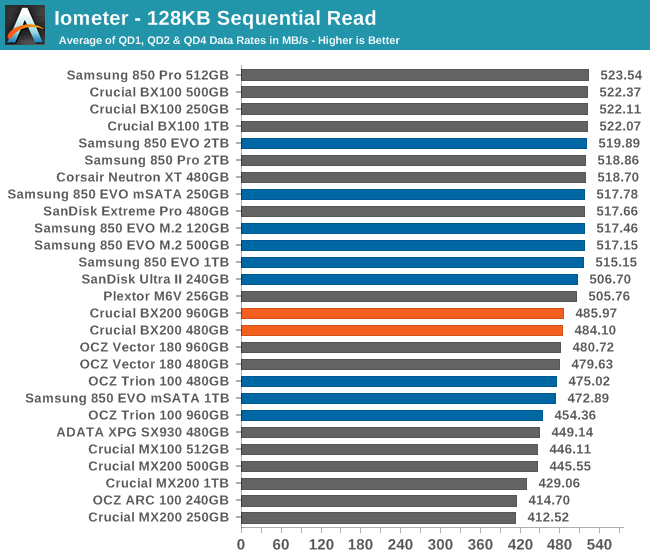
At last we see respectable performance from the BX200. Its sequential read speeds aren'te quite up to the SATA limit at low queue depths, but it can sustain solid performance. Unfortunately, for anyone holding out hope that the poor results we've seen so far may be a testbed issue, the otherwise respectable sequential performance puts that idea to rest.
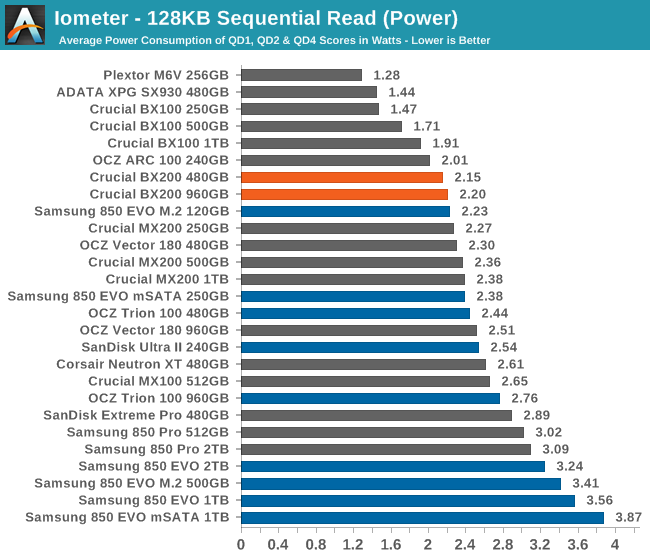
Power consumption on sequential reads is actually good, though it won't catch up with the best of drives.
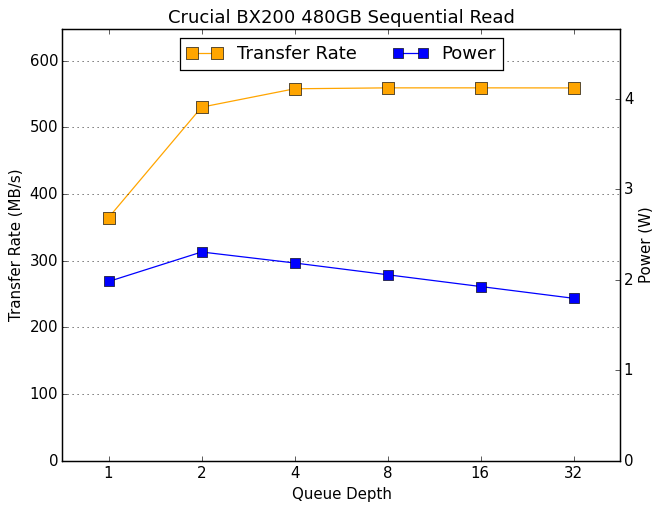 |
|||||||||
| Default | |||||||||
Given a larger queue depth, the BX200 is actually able to reach the performance plateau of the SATA speed limit; it just takes a little longer than the top tier of drives. Given the performance, it's not surprising to see that power consumption doesn't grow much. The shallow but steady decline in power consumption for the 480GB drive may be a sign that it's able to do some prefetching and caching to reduce the number of times it has to read from the flash.
Sequential Write Performance
The sequential write isn't limited to a small span of the disk, as that usually doesn't make a difference for this performance metric. As always, our averages are of the lower queue depths, but scaling to higher queue depths is also investigated. Bulk file copies and recording uncompressed video are the kind of uses that depend on sequential write performance.
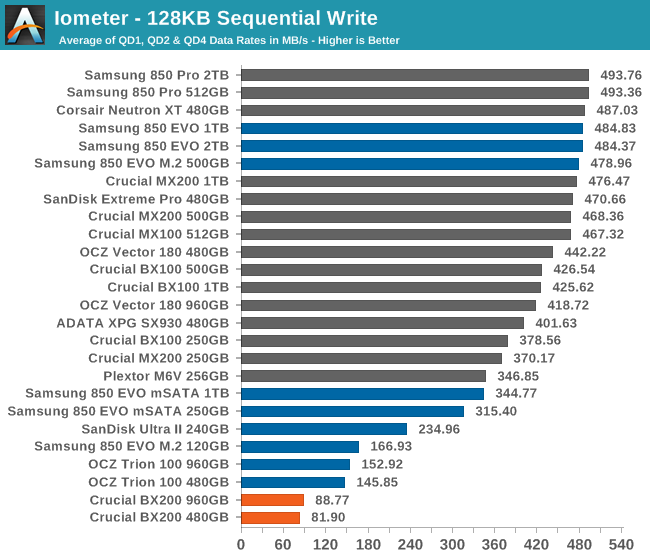
The initial good news we saw with the BX200's sequential read performance didn't last long. The drive's write performance is bad for sequential access just like random access, unfortunately displacing the Trion 100 as one of the worst drives in our current collection.
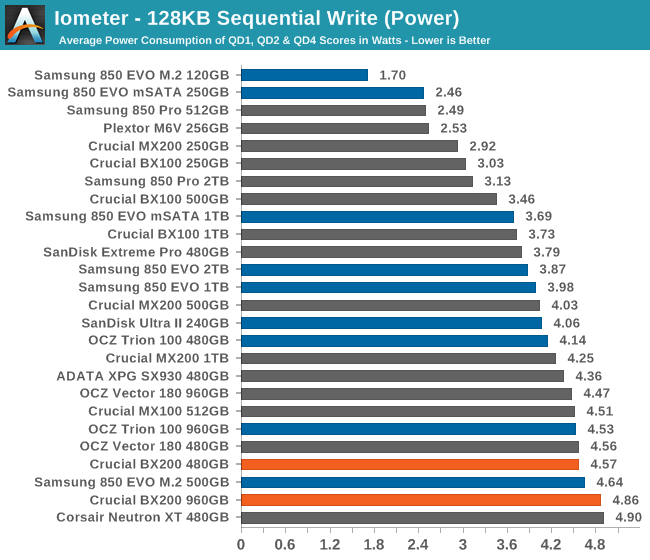
The BX200 power consumption during sequential writing is poor but not radically so. It would seem that Micron's TLC flash requires at most a little more power to write to than other TLC, and this drive is just wasting most of that power budget on background management.
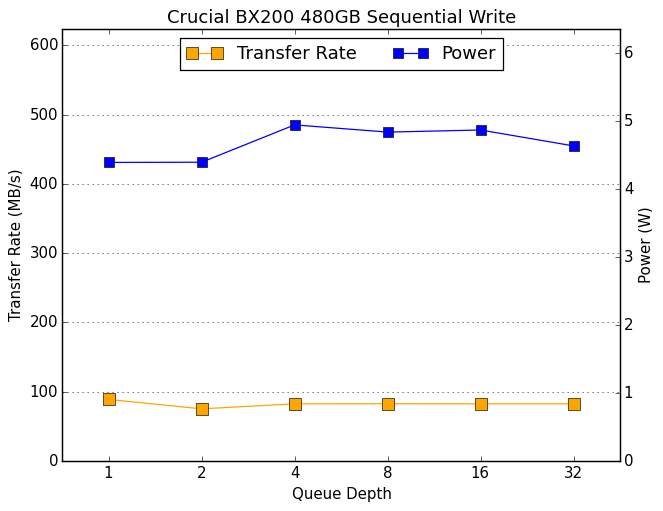 |
|||||||||
| Default | |||||||||
Looking at larger queue depths, performance drops slightly after QD1, and stays low as power consumption shifts around some but is always high. Neither capacity of the BX100 can sustain even 100MB/s of writes for a length of time.










85 Comments
View All Comments
extide - Tuesday, November 3, 2015 - link
So, apparently the first "bad" crucial SSD. Oh wait, no, the second one, remember that V4 or whatever it was, heh.hojnikb - Tuesday, November 3, 2015 - link
This is miles ahead V4, because this is usable, while V4 was not.iLovefloss - Sunday, November 8, 2015 - link
Nah, Crucial still had their M4 which quite a few issues for many people.Glock24 - Tuesday, November 3, 2015 - link
Wow, didn't expect such a product from Crucial. The only other SSD that performs worse than a mechanical disk is the Kingston SSD V300 that is still being sold.hojnikb - Tuesday, November 3, 2015 - link
V300, despite its hate, is still *much* faster than any HDD out there.Glock24 - Tuesday, November 3, 2015 - link
Maybe you got lucky, but I bought one after reading some good reviews (before the nand change fiasco hit the news) and after a while I noticed something was wrong because of the painfully slow performance. It was giving me reads close to 100MB/s and writes on the 20MB/s range, and that's sequential performance. I usually do not notice any difference in tel world performance between different SSD models, but with the V300 was very notorious. Even the HDD I had in use at the time felt faster (Spinpoint F1 1TB). So no, the V300 is not faster than any HDD.hojnikb - Tuesday, November 3, 2015 - link
that was a faulty model or issue on your end. eve the crappiest models were good for atleast 75mbs of write....Gigaplex - Tuesday, November 3, 2015 - link
And most hard drives these days can beat 75MB/s sequential write.hojnikb - Wednesday, November 4, 2015 - link
sequential speeds matter very little, its the random performace that makes ssds fast. and those are orders of magnitude better, even with v300jabber - Tuesday, November 3, 2015 - link
Yeah I use V300's exclusively in SATA II based PCs and laptops as they will push 270MBps+ all day long. No point buying 850 EVOs there. Must have bought 50+ and all of them are still going strong.